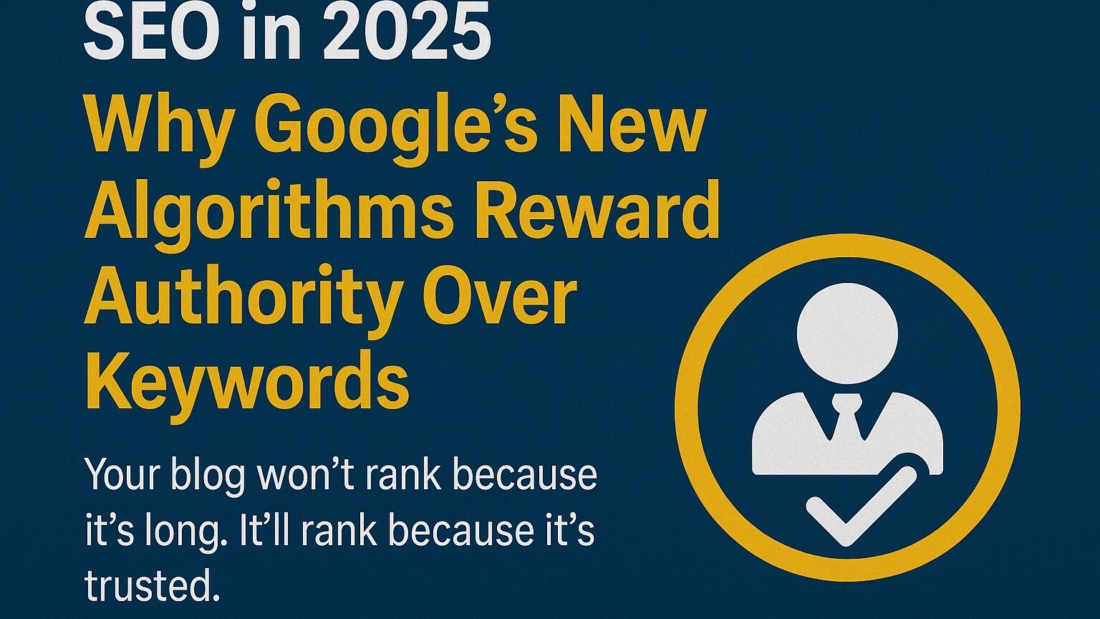Search engine optimization (SEO) has undergone a seismic shift in 2025. If you’re still stuffing keywords into 2,000-word articles hoping to outrank the competition, you’re playing yesterday’s game. Google’s newest algorithm updates—powered by advanced AI, behavioral analysis, and deep content evaluation—are prioritizing authority, trustworthiness, and content quality over keyword frequency or content length.
In this article, we break down what the new Google SEO landscape looks like, what “authority” really means, and what your business can do now to stay visible, competitive, and credible in search results.
What Changed in Google’s 2025 Algorithm?
In the past, SEO revolved around optimizing content around keywords—finding the right ones, placing them strategically, and maintaining ideal keyword density. But in 2025, Google is using AI-driven context analysis and E-E-A-T 2.0 (Experience, Expertise, Authoritativeness, and Trustworthiness) signals to assess content quality more deeply than ever.
Key Updates:
Authority over Keywords: Google now ranks content from recognized authorities higher than from new or low-trust sources—even if the latter is more keyword-optimized.
User Engagement Signals: Metrics like dwell time, bounce rate, and brand mentions on social media play a greater role in ranking.
Brand Identity Matters: Verified authorship, brand consistency, and digital reputation feed into your site’s SEO health.
Real-Time Content Understanding: Using advanced AI models, Google now understands the intent, depth, and contextual relevance of your content far better than before.
What Does “Authority” Mean in 2025 SEO?
Authority is no longer a vague SEO buzzword. It has a clear, algorithmic meaning in today’s search engine landscape. Here’s what makes up authority in 2025:
1. Topical Authority
If your website consistently publishes accurate, comprehensive, and user-first content on a specific topic or industry, Google recognizes it as a go-to resource. It’s no longer about covering many topics—it’s about being the best at a few.
Actionable Tip: Focus on topic clusters and content depth. Build internal linking between related pieces to create a content ecosystem.
2. Author Authority
Verified author profiles, real bios, LinkedIn and Google-author linked content now matter. Google rewards content written by recognized experts in the field.
Actionable Tip: Use schema markup to highlight authorship. Publish under real names with established credentials and build digital footprints outside your website (guest posts, interviews, citations).
3. Backlinks from Trusted Sources
It’s not about the number of backlinks anymore; it’s about the quality. A single link from a reputable site like Forbes, HubSpot, or a top industry blog is worth far more than dozens of backlinks from unknown blogs.
Actionable Tip: Focus your link-building efforts on building relationships, thought leadership, and PR-style outreach, not mass directory submissions.
Why Keyword-First SEO Is Dead
That’s not to say keywords are irrelevant. They still serve as signals—but only one among many.
Here’s why relying on keywords alone won’t get you far in 2025:
AI understands synonyms, context, and search intent, so repeating “best project management software” five times doesn’t help anymore.
Voice search and conversational AI are changing how people phrase queries. Google adjusts for natural language, not robotic phrasing.
Search is now visual, video, and multimodal, and keyword optimization doesn’t always apply directly to YouTube, image, or AI-driven search results.
How to Build Authority in 2025 (and Rank Because of It)
The good news? You don’t need to guess how to stay competitive. Here’s how you can pivot your SEO strategy to thrive under Google’s new rules.
1. Invest in Authoritative Content
Think less “blog posts” and more “resource hubs.” Create long-form, multimedia-rich content with original data, expert quotes, and actionable takeaways. Use FAQs, infographics, and short videos to increase engagement.
2. Showcase Real-World Expertise
Whether it’s via case studies, behind-the-scenes blog posts, or expert interviews—your brand must prove it has hands-on experience.
Example: If you’re an AI software firm like LogIQ Curve, don’t just blog about “AI in business.” Publish real stories of how your tools improved client ROI, with visuals, testimonials, and data.
3. Use Structured Data and Schema Markup
Highlight reviews, authorship, FAQs, organization details, and more using proper schema. This helps Google better understand and display your content in search results.
4. Build Digital Reputation
Invest in:
Social proof (testimonials, reviews)
Digital PR (mentions in credible news sites or blogs)
Online presence of your team (LinkedIn, GitHub, YouTube)
All these signals feed into perceived authority.
The Rise of “Trust Signals” in Rankings
Alongside authority, trustworthiness is becoming a major ranking factor. Google uses a range of indicators to assess trust:
HTTPS security
Clear privacy policies and contact info
Transparency in content (real authors, sources cited)
Consistent NAP (Name, Address, Phone) data across platforms
Positive brand sentiment online
Google’s AI can now interpret sentiment from user reviews and social chatter—meaning your reputation off-page directly affects how you rank on-page.
Final Thoughts: SEO in 2025 Is About Reputation, Not Just Relevance
SEO in 2025 is no longer a technical checklist. It’s a reflection of how your brand is perceived, how much value you provide, and how consistently you show up as a trusted expert.
Your blog won’t rank because it’s long.
It’ll rank because it’s trusted.
If you’re looking to upgrade your digital presence and rank with authority, LogIQ Curve offers full-spectrum SEO solutions that go beyond keywords—focusing on long-term credibility and search dominance.
✅ Want to Future-Proof Your SEO?
Let LogIQ Curve help you build a content strategy centered on trust, expertise, and authority. Contact us today to get started.

